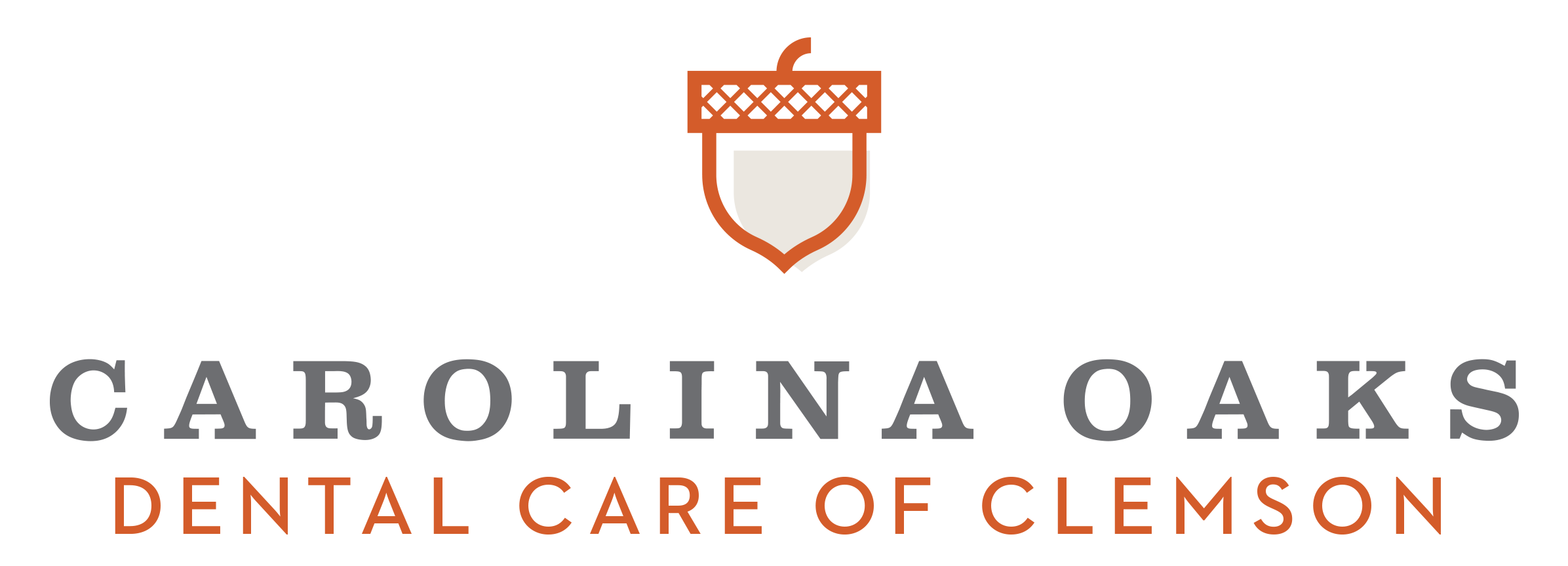Enrolling in dental insurance plans can be confusing. If you haven’t spent much money on a dentist in recent years, do you even need insurance? How much coverage is enough? Will I still have to pay for routine visits?
At Carolina Oaks Dental Care, our patients have a lot of questions about dental insurance, and we often hear the same questions again and again. The following frequently asked questions (FAQs) may help you understand what factors you should consider, as you look at enrollment options for your family.
If you need a dentist for your family, contact Carolina Oaks Dental Care. We can help you understand your insurance, and get you the care you need! Call our Clemson, SC, dental practice at 864-654-6700 to make an appointment today.
What does dental insurance pay for?
There are several levels of dental treatment that your family will need in the future. Most dental plans have similar rates for the different levels of care.
Preventive Care – Since preventive dentistry is the best way to avoid dental problems in the future, these treatments are usually the best covered by insurance. Many plans pay 100% of the cost of dental cleanings, exams, x-rays, and fluoride treatments. Since two dental visits are allowed per year, we see many patients become more faithful in keeping their appointments once they have insurance–and this is great for your health.
Basic Dental Work – Insurance usually pays for most of the cost of dental fillings, periodontal treatments, and root canals. You will always pay a portion out of pocket, but usually no more than 20-30%.
Advanced Dental Work – More advanced restorations usually require a greater patient co-pay. These include crowns, bridges, and dental implants. Considering that these treatments are not needed as frequently as small fillings and dental cleanings, most patients can afford to pay the usual 40-60% when they are needed.
Orthodontia – Most plans have some provision for orthodontia, but these vary significantly. If braces are likely in your child(ren)’s future, compare orthodontia coverage carefully, as it could make a huge difference in your future out-of-pocket costs.
What kind of coverage do I need?
The answer to this question will depend largely on your and your family’s circumstances. Most insurers give you the option to choose either a basic or extended plan. The best way to consider this choice is to think about your dental history and predicted dental needs.
There are many factors you may want to consider:
- Your Dental History – If you and your family have always faithfully seen the dentist, twice a year, and have no major dental concerns, then basic may be all you need. If you are more prone to tooth decay, or have risk factors that make you more susceptible to tooth and gum problems, you may benefit from greater coverage. For example, if you have several fillings from more than 12 years ago, you will likely need to have them all replaced. Greater coverage will reduce the amount you will pay for this undertaking.
- The Size of Your Family – Even with preventive visits well-covered by insurance, the cost of fillings and root canals can add up quickly if your children and spouse are susceptible to tooth decay.
- Your Age, Lifestyle, and Medical Conditions – Age and overall health have an effect on your oral health. Medical conditions like acid reflux and diabetes can hamper your mouth’s ability to resist tooth decay (as can many common medications) and you may need more dental care than normal. Even the predictable hormonal changes that accompany pregnancy and menopause can make you more likely to develop gingivitis and periodontitis (gum disease). Ask your dentist or dental hygienist for advice if you aren’t sure whether your medical conditions, age, or lifestyle may impact your oral health in the future.
- Your Family History – Many dental conditions have a genetic link, so if your parents needed a lot of dental work, developed gum disease, or lost their teeth as they got older, you may want to be ready in case the same happens to you. Preventable factors can also contribute to those conditions, too, of course, so ask your dentist for advice if you’re not sure.
- The Potential Need for Braces – If you have multiple children who may need orthodontic treatments, you should consider the financial impact beforehand. Misaligned teeth (malocclusion) is an inheritable trait, so if both parents needed braces, the children may also need them.
If you are comparing dental plans and not sure how your family’s situation might be affected—call us and ask. What is a complex question to you may be routine for us. At Carolina Oaks Dental Care, we always want to help our patients have the knowledge they need to make good decisions for their families.
Do I even need dental insurance?
If you are a single adult, with excellent dental habits and a clean dental history–AND you already see a dentist regularly for routine six-month visits–you may actually save money by paying dental expenses out of pocket. Most people do not fit into this category, however. For starters, about 99% of the population will suffer from tooth decay, to some degree, in their lifetime. Furthermore, there are many factors that influence your oral health at different stages of your life. Lucky streaks can end, leaving you with heavy out-of-pocket expenses. If you think you may be one of the people who don’t need dental insurance, ask your dentist for a professional opinion.
What’s a DHMO, versus a PPO?
A PPO plan offers you a wide network of providers to choose from. They usually let you choose a dentist outside the network, as well, albeit at a different rate. With a PPO you will have more options when choosing a dentist, but the monthly cost will be higher than that of a DHMO.
DHMO plans offer the same quality dental care, but from a more limited list of contracted providers. If you are on a tight budget, a DHMO will certainly get your family the care they need. However, you sacrifice the flexibility of a wide-network PPO. For some families, choosing a DHMO is an excellent way to save money, while still getting quality dental coverage.
Learn More
For more information, there are several dental insurance sites that aim to inform, instead of sell. These sites can explain terminology and the options available to you and your family. Ask your employer for a benefits comparison chart, as well. Chances are, they have information ready to help you with your decision.
If you need dental care for your family, contact Carolina Oaks Dental Care. Call our Clemson, SC, dental practice at 864-654-6700 to make an appointment today.



